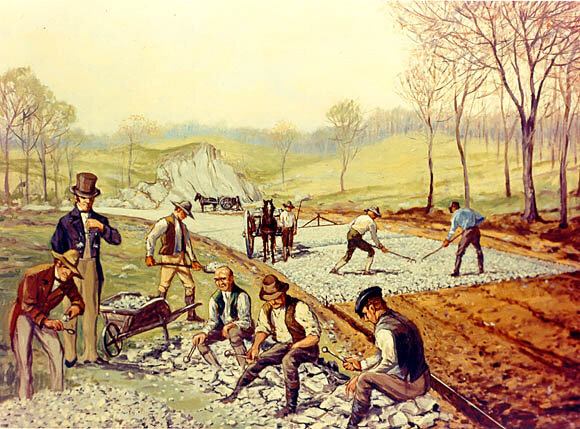The Unites States remains the largest and most successful country economically in the world today. But how did it become so successful? Here, Daniel L. Smith argues that an economy underpinned on Christian values that led to the success of America – and that religion is a key factor in economic success more broadly.
Daniel’s book on mid-19th century northern California is now available. Find our more here: Amazon US | Amazon UK
The first American macadam road, Boonsborough Turnpike Road, between Hagerstown and Boonsboro, Maryland, 1823. Picture by Carl Rakeman.
Two words. We can either call it the old-fashioned “Protestant ethic.” Or, what’s better known today as “work ethic.”[1]
Believe it or not, an economy underpinned by Christian values fueled the growth and success America has been known for all over the world. I have heard the argument, “Why are other countries so broke and poor, while we are so spoiled rich?” This comment may be generalized, but it gives a great idea into a typical daily dinner-table conversation. Let’s clarify this.
Nations grow with time - economically, politically, and socially. You can look at a nation from it’s beginnings through to its ending, and its represented by what could resemble a tree that continues to branch outward. Laws are the basis for any civilization and start in a more basic fashion. Over time, laws will continually be added too and expanded upon, so helping to form a culture.
Since law and culture is created out of religion and religious function, there is only one logical conclusion: A nation’s government, which is based in laws rooted in religion, is the key primary source to any nation’s ultimate success.
While America has recently abandoned some of the traditional principles that have produced its prosperity, the country is still the most prosperous and successful nation in the world. Historian David Wolfe writes that “the best way to compare the real wealth of the people of one country with the wealth of the people of another is how many hours of work it takes a factory worker to earn the money needed to buy the same basic commodities in retail stores in that country.”[2]
To buy a kilogram of bread, for example, a factory worker must work 18 minutes in Moscow (Russia), 12 minutes in London (UK), and 8 minutes in Washington (USA). To buy a car (Volga, Ford), that work time is 35 months in Moscow, 8.5 months in London, and 4.1 months in Washington.[3]
Work and Necessity
Let’s say that you take a trip to the Philippines. You will find that clothes are around one-third to one-quarter the price of those in the United States. This might be great to the typical American traveler, but it is driven by lower salaries in the Philippines. An average American worker’s salary is ten times the pay that the average worker in the Philippines.
Ultimately, the average Filipino spends more of his paycheck on food and clothes than the average American—even though these necessities cost much less in the Philippines than in the USA. A key reason why Filipinos spend more of their money on other items is because appliances, cars, electronics, and other merchandise that is not made in their own country, often cost more than they do in the United States.[4]
It is this economic reality that applies to every single nation around the entire globe. Those societies that are built on Christian principles have a proper foundational view of natural resources, and will also carry the character to exert human energy, and be given access to the creativity of God leading to better tools, all of which cause man’s material assets to increase.
While any nation adhering to this truth will see their material welfare increase, most people and nations are quite poor. Dr. Stephen K. McDowell of Providence Foundation mentions that, “46% of the world lives in poverty today.” [5] While we can debate the exact percentage of people in poverty, we should still ask why are some countries so much poorer than others? Some claim lack of natural resources, yet some nations, like Japan, with very few natural resources are actually really prosperous. There are also many nations with abundant natural resources that are much less successful than countries with few natural resources.
And while we can consider factors other than natural resources as being important to economic success, I think my argument is important - and often overlooked: While not often considered by economists, ultimately I would argue that the religious basis of countries is a key factor in determining how many countries became wealthy and why they are wealthy today.
What do you think of the author’s argument that religion is a key factor in an economy’s success?
You can read a selection of Daniel’s past articles on: California in the US Civil War (here), Spanish Colonial Influence on Native Americans in Northern California (here), Christian ideology in history (here), the collapse of the Spanish Armada in 1588 (here), early Christianity in Britain (here), the First Anglo-Dutch War (here), and the 1918 Spanish Influenza outbreak (here).
Finally, Daniel Smith writes at complexamerica.org.







